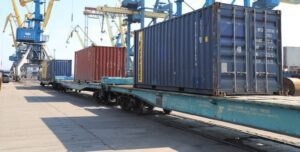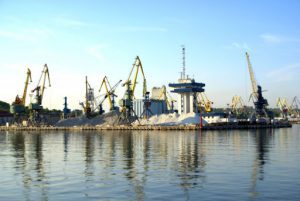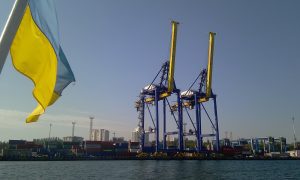
A modern container terminal could be built in the port of Mariupol (Donetsk region) on the territory of the former coal-loading complex, Ihor Barsky, the head of Mariupol seaport.
“In the long term, we have a dream: to turn the territory of the former coal loading complex of the seaport into a modern container terminal,” he said during the NewPort international exhibition in Kyiv.
Barsky recalled that since 2015, the container flow in the Sea of Azov has been completely stopped. Container lines stopped making calls to Azov after the imposition of European and American sanctions on Crimea.
“Now we are working to return container traffic to Azov. We are supported in this issue by the city, the region, the Ministry of Infrastructure. This is a difficult task, but solvable,” he said.
According to him, at present the port has pre-design studies of this terminal, in the future a feasibility study will be ordered.
“Now we are liquidating the loading complex, selling the equipment that is there, and preparing this serious investment site. How much it will cost – I can’t say yet. We can talk about this when the feasibility study is completed,” Barsky summed up.

In Ukraine, residents of Severodonetsk (Luhansk region), Mariupol (Donetsk region), Kharkiv and Odesa the best treat Russia, according to the results of a study conducted by the Rating sociological group on behalf of the Center for Analysis and Sociological Research of the International Republican Institute.
According to the survey, 17% of residents in Severodonetsk assessed the attitude towards the Russian Federation as very warm, 30% – as warm, 34% – neutral. In Mariupol, 14% have a very warm attitude, 38% – warm, 25% – neutral.
In Kharkiv, the figures are 12%, 27% and 30%, respectively, in Odesa – 9%, 31%, 34%.
The attitude towards the Russian Federation among the residents of Zaporizhia is slightly worse: very warm – 8%, warm – 24%, neutral – 35%. In Mykolaiv, respectively, 8%, 19%, 32%, in Dnipro – 6%, 23%, 36%.
The worst attitude towards Russia is in Lviv. There, only 1% has a very warm and 3% warm attitude, 18% – neutral. Some 58% of residents are very cold and 17% are cold.
A similar situation is in Ivano-Frankivsk and Ternopil, where 50% are very cold towards Russia.
The survey was conducted in 24 regional centers of Ukraine, in non-occupied territories, including Mariupol and Severodonetsk in Donbas. The survey was conducted on the basis of a sample that included 19,196 respondents.
The study was conducted from May 12 to June 3, 2021 using face-to-face interviews at home with respondents.
The statistical error for each city does not exceed ± 3.5%. The attainability of the respondents averaged 65%.

Mariupol Illich Iron and Steel Works (Donetsk region), a member of the Metinvest Group, in 2020 increased the production of general rolled products, according to recent data, by 12.4% compared to the previous year, to 3.67 million tonnes.
As the enterprise told the Interfax-Ukraine, steel production during this period increased by 13.7%, to 4.05 million tonnes, cast iron by 4.4%, to 4.65 million tonnes, and sinter by 12.8%, to 12.34 million tonnes.
In December, Mariupol Illich Iron and Steel Works produced about 320,000 tonnes of general rolled products, 345,000 tonnes of steel, 330,000 tonnes of cast iron, and 1.06 million tonnes of sinter.
Illich Iron and Steel Works is part of Metinvest Group, the main shareholders of which are SCM Group (71.24%) and Smart-Holding (23.76%), jointly managing the company.
Metinvest Holding LLC is the managing company of Metinvest Group.
ILLICH IRON AND STEEL, MARIUPOL, METINVEST, METINVEST’S COMPANIES, STEEL

Mariupol-based PJSC Illich steel mill, a member of the Metinvest group, in January-November of this year increased the production of general rolled products, according to operational data, by 9.8% compared to the same period last year – to 3.34 million tonnes.
Steel production during this period increased by 12.9% – up to 3.7 million tonnes, pig iron – by 5.2%, to 4.32 million tonnes, sinter – by 12, 6%, to 11.28 million tonnes, the enterprise told the Interfax-Ukraine agency.
In November, the mill produced about 330,000 tonnes of general rolled products, 350,000 tonnes of steel, 370,000 tonnes of pig iron, and 1.1 million tonnes of sinter.

Mariupol seaport (Donetsk region) increased handling of goods by 11.26%, to 5.881 million tonnes in January-October 2020 compared to the same period in 2019.
According to the website of the Ukrainian Sea Ports Authority (USPA), during this period the seaport increased handling of export cargo by 14.56%, to 4.965 million tonnes, and of coastal cargo by almost 70 times, to 384,600 tonnes, but reduced handling of imported cargo by 43.9%, to 631,310 tonnes. At the same time, the seaport did not handle transit cargo.
In terms of the cargo nomenclature, over the ten months the enterprise increased handling of bulk cargo by 3.91%, to 130,100 tonnes, and packaged goods by 25.86%, to 4.008 million tonnes, but reduced handling of dry bulk cargo by 11.81%, to 1.743 million tonnes.
During this period, no containers were transshipped in the seaport.
As reported, the volume of cargo handling at Mariupol seaport in 2019 increased by 10%, to 6.484 million tonnes compared to 2018.
Mariupol seaport is one of the largest ports in Ukraine. Its capacity allows transshipping over 17 million tonnes of cargo per year. The port is open year-round for vessels up to 240 meters in length and up to eight meters draft. Its territory is 73.2 ha, and the length of the berthing line is 4.2 km.

Mariupol seaport (Donetsk region) in January-September 2020 increased cargo transshipment by 16.5% compared to the same period in 2019, which is 5.335 million tonnes.
According to the website of the state-owned enterprise Ukrainian Sea Ports Authority, the port increased the transshipment of export cargo by 17.41%, to 4.461 million tonnes during this period, but reduced the transshipment of imported cargo by 36.84%, to 489,900 tonnes, and increased transshipment of cabotage goods by more than 83.5 times, to 384,200 tonnes. At the same time, the port did not handle transit cargo.
In terms of the cargo nomenclature in the nine months of 2020, Mariupol port increased the transshipment of liquid cargo by 10.91%, to 118,900 tonnes, reduced the transshipment of bulk materials by 2.71%, to 1.599 million tonnes, and increased the transshipment of packaged goods by 27.86%, to 3.617 million tonnes.
During this period, no containers were transshipped in the port.
As reported, the volume of cargo transshipment at Mariupol seaport increased by 10% to 6.484 million tonnes in 2019 as in comparison to 2018.
Mariupol seaport is one of the largest ports in Ukraine. Its capacity allows transshipping over 17 million tonnes of cargo per year. The port is open year-round for vessels up to 240 meters in length and up to eight meters draft. Its territory is 73.2 ha, and the length of the berthing line is 4.2 km.